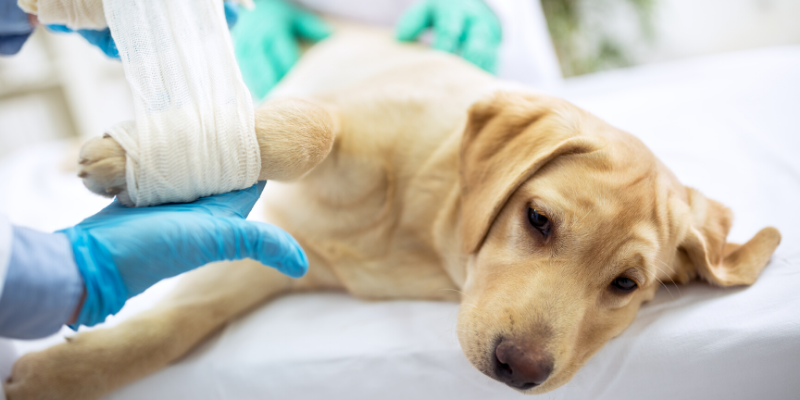
In all cases of emergency, please take care – injured pets will not mean to, but they can panic and bite or scratch. The following is a short summary of the most pertinent advice in each scenario. If you are uncertain, call a vet before taking action.
Creating a first aid kit
Having a small first aid kit of essentials is a great idea for both home and travel. Here’s a list of the some of the things we would recommend including:
- Tick twister – A small tool used to extract ticks safely.
- Bandaging materials – for example, a non absorbent double sided wound pad, a lightweight padding bandage, a roll of regular bandaging material (co-form) and a roll of vet wrap bandage. You can make up your own kit with suitable wound dressings, bandages and self adhesive tape.
- Blunt ended scissors – Used for cutting bandaging material.
- Old towel or blanket – Used for wrapping injured pets and keeping them warm. Can also be used as a makeshift stretcher for larger dogs. An emergency foil blanket is also a good addition.
- Bottled water and a dog bowl – To hydrate dogs and avoid heatstroke.
- Vinyl gloves – Useful in messy situations.
- Your vet’s number – Have this written down in your first aid kit. If you’re travelling, be sure to look up the contact details of a local emergency vets beforehand.
Cuts, grazes and small wounds
Puncture wound – don’t remove the object, apply pressure around wound and contact the vet immediately. Puncture wounds have a high chance of becoming infected.
Heavy bleeding – Apply pressure and place a pad on the wound. Next apply the lightweight padding bandage layer thinly and without too much tension, you should be able to fit two fingers in the top of the bandage. Apply the bandage moving up the leg towards the body. Next apply the ‘co-form’ bandage and finally the ‘wrap’ bandage. If blood soaks through the bandage, apply more layers, do not remove previous layers and contact the vet immediately.
Burns
Chemical burns – Do not wash with anything, contact the vet and bring the packaging of the chemical with you.
Heat burns – Run cold water over the wound or apply a cold compress, contact the vet.
Eye injuries- If chemicals splash in the eyes, wash them with lots of tap water for 15 mins, while calling the vet.
Insect bites and stings
Look for any rash or swelling. Do not remove a sting with tweezers, instead scrape a credit card over the surface to try and remove. Soothe the sting/bite with a towel wrapped ice pack. Call a vet if the sting is around the mouth or throat or there are any signs of an allergic reaction.
Adder bites
Bites appear as dark swellings, sometimes with two puncture marks. Carry your pet to try and reduce the spread of the venom around the body and contact the vet immediately. Do not tourniquet the wound.
Heatstroke
Look out for drooling, panting, increased heart rate and lethargy. Call your vet as soon as possible, in mild cases cool your pet down with cool, damp towels and small amounts of water.
Fitting and seizures
Stay calm. Don’t move your pet during a seizure, as you could hurt them or yourself, unless they are in immediate danger. It is better to move furniture and other items away from them, rather than moving them. Stay away from their mouth and head, they may bite inadvertently; try to talk to them reassuringly. Time the seizure if possible and call a vet when the seizure ends. If you are able to video your pet’s seizure, this can be very helpful for the vet to see.
Emergencies – when to call a vet immediately
- Difficulty breathing
- Collapse/shock
- Fit/seizure
- Unable to urinate or defecate for 24hrs
- Serious trauma/broken bones
- Haemorrhage (severe bleeding from anywhere)
- May have ingested something toxic eg. chocolate, slug bait, human medication. Do not induce vomiting. Call your vet and give them as much information as possible.
Please note in all scenarios, it is best to phone the vets to let them know you are coming, even if you head straight to the practice. This gives them time to prepare and make sure all necessary staff members are available when you arrive.
Call us on 01435 864422 in case of an emergency.

